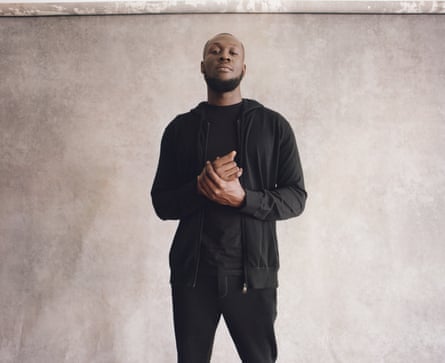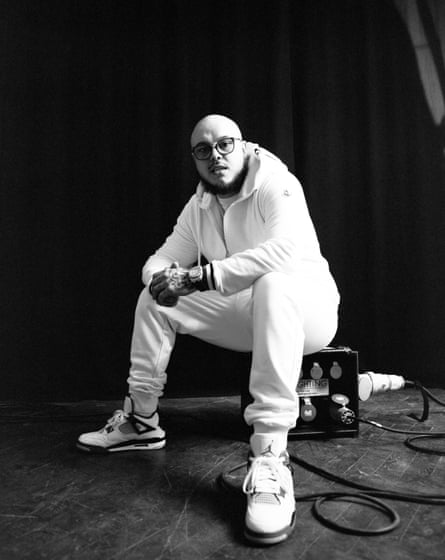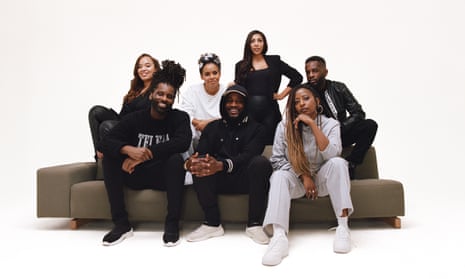Rick Rubin’s initial ambitions for Def Jam were modest. In 1984, it was simply a means for him to release music by his punk rock band, Hose. Its first office was his New York University dorm room. “We never had any aspirations other than playing in small clubs,” he says. “That was the ceiling for the hardcore punk scene at that time. It was really more about being a part of something: a community of outsiders making music, mainly for ourselves and each other.”
Thirty-seven years later, the most iconic label in hip-hop is part of Universal Music, and commands a vast legacy. It united the nascent NYC rap scene with Public Enemy and Beastie Boys, while Walk This Way, Run-DMC’s collaboration with Aerosmith, helped open a door to hip-hop for white audiences. A slump in sales left it $19m in debt by 1992, but the multi-platinum success of Warren G’s 1994 debut, Regulate ... G Funk Era, restored the label’s fortunes. Kanye West, DMX and Jay-Z took it to superstardom – the latter spending three years as president from 2004 to 2007, signing Rihanna and Ne-Yo. A year later, Def Jam signed Justin Bieber. Its reputation was recently tainted after a series of women accused co-founder Russell Simmons of sexual assault, which he denies. But Def Jam endures; Snoop Dogg recently signed on as a creative consultant.
Its latest chapter is 0207 Def Jam, a new UK imprint established by the British music executives Alex and Alec Boateng with the blessing of Rubin and Universal Music UK’s CEO, David Joseph. Its name inspired by the inner London telephone code, the label has lured Stormzy away from rivals Atlantic just two years after he signed a splashy deal, and their founding roster includes chart stars such as the Essex road-rap star Potter Payper. Most significantly, 0207 has a mostly female and entirely minority ethnic team of executives, an important development as the UK major label system – so reliant on Black creativity – tries to establish more diversity in its overwhelmingly white boardrooms.

In the mid-1980s, that progressive ethos infused Def Jam’s DNA. “The punk rock and hip-hop trajectories were somewhat similar: both were being made by young people without virtuoso skill, and both were about ideas more than musicianship,” says Rubin. “They were edgy and frowned upon by anyone who wasn’t part of the respective scenes.”
Having risen through London’s first grime wave in the early 00s, the Boateng brothers are now co-presidents of 0207 Def Jam, and two of the few Black faces in UK music industry boardrooms. Industry body UK Music found that ethnic diversity across the industry increased from 17.8% in 2018 to 22.3% in 2020, but less than a fifth of executives are non-white, and only 6% are Black, despite the cultural dominance of various styles of rap, plus R&B, African pop, soul and dance music – all rooted in Black culture – remaining hugely popular. A new global report by the Annenberg Inclusion Initiative found that just 7.5% of 4,060 executives at vice-president level and above are Black.
“There are a number of reasons why the data sometimes doesn’t feel reflective of the music or audiences it serves,” says Ammo Talwar, diversity taskforce chair of the industry body UK Music and CEO of Punch Records in Birmingham. “Regardless of retrograde reports thrown out by the government, we as diverse communities know that systemic racism and historical bias still exist in all walks of life. The music industry is no different. Actually, it’s very well placed to lead on the changes needed to make the UK more equitable.”
Following the murder of George Floyd last year, Black music industry employees took the business to task on race. Out of that came Blackout Tuesday; on 2 June 2020, activity stopped for the day in solidarity with the ongoing fight against racism. The big three labels, Universal, Sony and Warner, launched social justice funds in the high millions; labels and industry bodies such as the Grammys pledged to stop using the condescending term “urban” to describe Black music. Generous financial pledges aside, many are looking for lasting change within these corporate cultures that would improve the career progression of Black employees.
At Island Records, Alex Boateng worked with everyone from Drake and Sean Paul to Giggs and viral rapper Big Shaq. His boss was Darcus Beese, son of Darcus Howe, the racial justice campaigner, whose story was recently partly told in the Mangrove episode of Steve McQueen’s Small Axe. “It’s probably no accident that I feel confident stepping into this when I have an example of a Black leader at a record company like [Beese]. Darcus wasn’t a quiet Black man who just fit in. He was disruptive in ways that mattered; he was vocal about all forms of injustice,” he says. Alex cites their work with charity Key4Life, who work with young offenders. “We went into the prisons and had them come into Island for them to progress to the next stage in their lives.”
Alec Boateng (also known as Twin B, a former BBC Radio 1Xtra host) left his position as head of A&R at Atlantic, where he worked on big hits for Stormzy, Burna Boy, Jess Glynne and more, to join his twin at 0207. In the liner notes to his No 1 album Heavy Is the Head, Stormzy wrote, in a long essay praising Alec: “There is no one more responsible for my growth and development as an artist and a musician.”
Despite his success, Alec felt a “responsibility” to champion Black artists in a more sustained way, “an area of music that hasn’t necessarily had the resources and expertise, traditionally. Which is why a lot of Black artists have famously been independent [from record labels]. The independent flag is one a lot of artists wave high, but I think that that’s down to a lot of the bad experiences Black artists and people of colour have had over the years.”

Alec says that it’s thanks to support from teams who understand Black British culture that the likes of Dave, Stormzy and J Hus have broken out of “what I’ve heard previously described as Silver Club”, a history of Black artists rarely surpassing silver sales certifications (200,000 singles or 60,000 albums). Equally, he says: “Stormzy isn’t historically the type of British artist that has earned the right, and even had the success, to headline Glastonbury, but positive things are happening that are balancing the industry and changing the cast list as a whole”.
Alex clarifies that while he supports and appreciates the initiatives for change in a post-George Floyd world, “it’s important to note that us getting this job and this company didn’t emerge after [the recent uprising led by] Black Lives Matter. We all worked really hard to be here, and David [Joseph] told us both that he always saw us running a label. It wasn’t because we’re Black – it’s because we had success.”
It is striking that beneath the Boatengs, each 0207 head of department is a woman from either a Black, Asian or minority ethnic background. “If you look at the charts, and at the people consuming music, they are diverse,” says Alex. “So if the people making the decisions aren’t diverse, you’re selling yourself short. We’ve got people from all backgrounds, so we’re able to have diverse opinions, conversations, arguments and disagreements. The people that then get our attention benefit from that. So it’s not about trying to tick boxes. The people in our leadership team are female and diverse as a secondary fact to them being amazing at their job. It’s just that the industry is catching up.”

Amy Tettey, 0207’s managing director, who spent 11 years in finance at Island Records, agrees. “It shows other companies in the industry, who perhaps don’t have that balance, what is actually possible and that there really is no excuse.”
Stormzy is currently recording a new album after his five-continent world tour was cancelled due to coronavirus. How did 0207 draw him away from Atlantic, which released Heavy Is the Head and gave him his own sub-label? “In terms of how it looks, it was very loud for him to leave one company and go to another,” Alec says. “But it was one small conversation. It no doubt sounds crazy that this level of business and such a huge decision can have that simplicity. But it reaffirms that it’s who, and not where, in life sometimes.”
The UK rapper Wretch 32, who had five Top 10 singles in the 2010s and has worked with the twins for more than a decade, is the label’s creative director. He sees his position as a bridge between label and artists. “Trust is important,” he says, “and I think artists trust other artists.”
He will be discovering talent alongside A&R director Char Grant, who had success with MNEK, Little Mix and Alexandra Burke and as an A&R at BMG. As well as Stormzy, the label’s launch roster includes soul singer Debbie, pop-R&B crooner Tendai and Potter Payper, whose independent 2020 mixtape Training Day 3 reached No 3 in the UK album charts. “If anyone can elevate me beyond where I’ve been before, it’s this specific set of people,” he says. The marketing director, Jacqueline Eyewe, says the label’s artists could be “writing a book or starring in a show, or creating opportunities for young people” as well as making music, and the promotions director, Heidi Jacob, hopes to get back to basics after the pandemic, using “street teams” where artists meet fans in person. “Nothing beats face-to-face.”
Rubin has high hopes for the label. “I’ve always been hopeful that the UK would breed a British invasion in America for hip-hop, in the way it did with the Beatles and Merseybeat,” he says. “Maybe this can set the stage for that dream to come true.”
